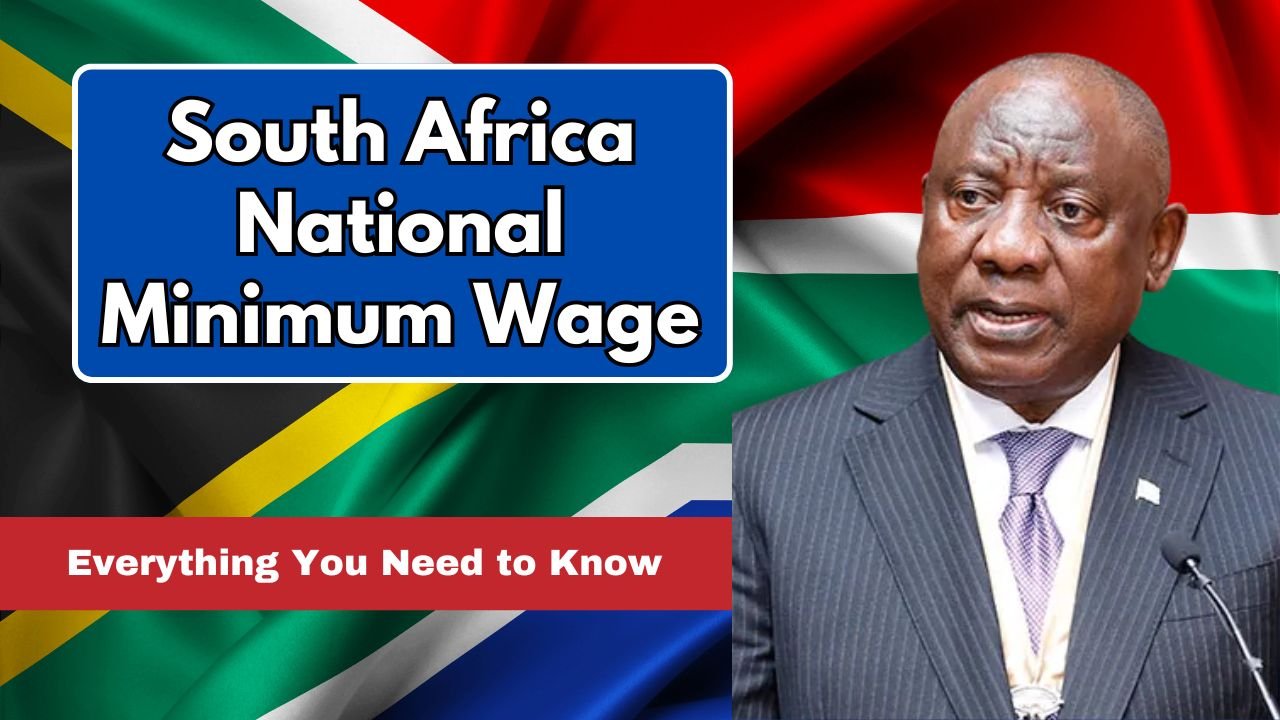South Africa’s labor landscape has undergone a significant transformation in 2025, primarily driven by updates to the South Africa National Minimum Wage and reforms to employment equity regulations. These updates are critical not only for local businesses and employees but also for international investors and multinational corporations, including those based in the United States. By addressing income inequality and reinforcing fair workplace practices, the South African government aims to balance social justice with sustainable economic growth.
2025 UK Minimum Wage Hike: New Rates, Eligibility, and Impact on Workers
In this comprehensive guide, we will explore the 2025 South Africa National Minimum Wage updates, key employment equity reforms, and their practical implications for both employers and workers.
National Minimum Wage Update 2025
Effective from March 1, 2025, the South Africa National Minimum Wage increased to 28.79 South African Rand (ZAR) per hour, up from 27.58 ZAR. This represents a 4.4% hike, designed to offset inflation, improve workers’ living standards, and reduce income inequality across sectors.
The increase applies broadly, covering most industries, while certain categories, such as participants in government employment schemes and learnership programs, have specific adjusted rates. South Africa National Minimum Wage
Updated Minimum Wage Table (2025):
| Worker Category | Minimum Wage per Hour (ZAR) |
|---|---|
| General Workers | 28.79 |
| Farmworkers & Domestic Workers | 28.79 |
| Expanded Public Works Programme (EPWP) Workers | 15.83 |
| Learnership Participants | Varies (allowances updated) |
The EPWP workers receive a lower wage of 15.83 ZAR, acknowledging the temporary and skill-building nature of these positions. Meanwhile, learnership participants benefit from updated allowances aimed at incentivizing training and skill development, reflecting the country’s broader focus on workforce development.
Opportunities and Challenges for Businesses
The 2025 South Africa National Minimum Wage increase presents both opportunities and challenges. On the positive side, higher wages can boost worker morale, increase productivity, and reduce employee turnover. For many South African households, this adjustment represents meaningful relief amid rising living costs.
However, small and medium enterprises (SMEs) may feel financial pressure due to higher payroll expenses. Businesses may need to reassess staffing strategies, including reducing work hours, slowing hiring, or investing in automation to offset wage increases. The challenge lies in balancing enhanced worker welfare with sustainable business operations in a competitive economic environment.
Refined Employment Equity Regulations 2025
Alongside the minimum wage updates, South Africa introduced new Employment Equity Regulations effective April 15, 2025, replacing the 2014 framework. These reforms aim to ensure more inclusive and representative workplaces by establishing sector-specific numerical targets. South Africa National Minimum Wage
Key points include:
-
Designated Employers: Companies with more than 50 employees are now considered designated employers, expanding the scope of mandatory compliance.
-
Five-Year Employment Equity Plans: Employers must create detailed plans covering September 1, 2025, to August 31, 2030, aligned with sectoral targets across 18 economic sectors.
-
Occupational Level Goals: Plans must consider four occupational levels and include a target of 3% employment for individuals with disabilities.
The removal of turnover-based thresholds means more companies must implement affirmative action and equity strategies, increasing accountability and workplace transparency.
Also Read – Honda ZR-V Hybrid 2025: Premium SUV with 27.1 KMPL Mileage, Advanced Tech, and Honda Sensing Safety
Compliance and Penalties
Employers failing to meet equity targets without justified reasons may face strict consequences. Compliance enforcement is managed by the Department of Employment and Labour. Penalties can range from 1.5 million to 2.7 million ZAR, or a percentage of annual turnover, depending on the severity and recurrence of violations.
This rigorous enforcement underscores the government’s commitment to transforming workplaces and ensuring historically marginalized groups, particularly Black Africans, are better represented in senior and managerial roles. South Africa National Minimum Wage
Implications for Businesses
For companies operating in South Africa or planning investment, understanding the South Africa National Minimum Wage and employment equity changes is essential. Payroll systems must reflect new minimum wages, and human resources strategies should incorporate sector-specific equity requirements.
For U.S.-based companies with South African operations, compliance management is crucial to avoid legal penalties and maintain corporate reputation. Proactive alignment with government equity targets can also improve community relations and eligibility for government contracts.
Businesses may need to consider flexible strategies to manage rising labor costs, such as:
-
Restructuring wage policies without compromising worker satisfaction.
-
Exploring technology-driven productivity improvements.
-
Offering enhanced training to improve employee efficiency.
Implications for Workers
For employees, the 2025 South Africa National Minimum Wage increase represents a positive step toward fairer pay and improved living standards. Workers across general sectors, domestic service, and farm roles will see immediate benefits. Learnership participants gain enhanced support for skill acquisition, which can improve long-term earning potential. South Africa National Minimum Wage
Nonetheless, some workers, especially in low-skilled positions, may face reduced hours or limited hiring due to employer cost management. The government’s challenge remains ensuring that higher wages and equity policies enhance livelihoods without creating unintended employment barriers.
Sector-Specific Impacts
1. Retail and Hospitality:
Industries with high concentrations of minimum wage workers may experience increased operational costs. Employers may adjust pricing, staffing patterns, or benefits to accommodate higher payroll expenses.
2. Health and Social Care:
Higher minimum wages can improve workforce retention and service quality. Care roles become more attractive, encouraging experienced professionals to remain in or join these sectors.
3. Construction and Skilled Trades:
Increased apprentice wages may lead to more applicants for training programs, helping employers build skilled labor pipelines and promote long-term growth.
4. Gig Economy and Flexible Work:
Even contract-based or gig workers must receive wages meeting the updated South Africa National Minimum Wage thresholds, ensuring legal protection across employment types. South Africa National Minimum Wage
Benefits of the 2025 Updates
The wage increase and revised employment equity rules together aim to:
-
Reduce income inequality and poverty.
-
Promote equitable representation in the workforce.
-
Encourage sustainable skill development through learnership programs.
-
Enhance social justice while maintaining economic growth.
These policies reflect a broader global trend of balancing worker welfare with business sustainability, which is especially relevant for U.S. investors and multinational corporations observing emerging market labor reforms.
Challenges to Watch
Despite these benefits, businesses and policymakers must navigate several challenges:
-
Operational Costs: Wage increases can strain company budgets, particularly for SMEs.
-
Employment Levels: Potential reductions in hiring or working hours may affect low-skilled workers.
-
Compliance Requirements: Companies must adopt detailed equity plans and demonstrate progress.
-
Global Competitiveness: Firms must remain profitable while meeting labor and equity standards to compete internationally.
Conclusion
The 2025 updates to the South Africa National Minimum Wage and employment equity regulations mark significant progress toward equitable labor practices. The minimum wage increase to 28.79 ZAR per hour and the five-year, sector-specific equity plans highlight the government’s commitment to reducing structural inequalities while fostering economic growth.
For employers, especially international companies, understanding and adapting to these changes is crucial to ensure compliance, sustain business performance, and leverage opportunities for workforce development. For employees, these reforms offer improved pay, better working conditions, and enhanced opportunities for skill development.
Overall, South Africa’s labor reforms in 2025 provide a valuable case study for countries worldwide, demonstrating the balance between social responsibility, fair labor standards, and economic viability. Keeping abreast of these regulatory changes will be essential for companies, employees, analysts, and policymakers engaged with South Africa’s evolving labor market.
Hyundai Sonata 2025: A Premium Sedan Redefining Comfort, Technology, and Efficiency
Some Important Link
| Download News APP | Click Here |
| WhatsApp Group | Click Here |
| Home Page | Click Here |





